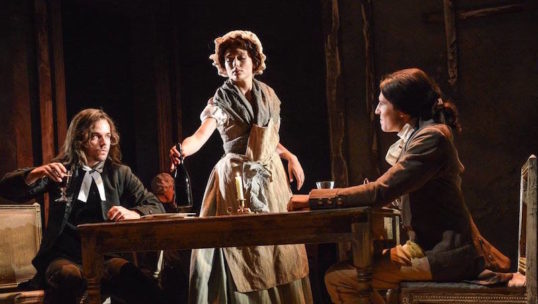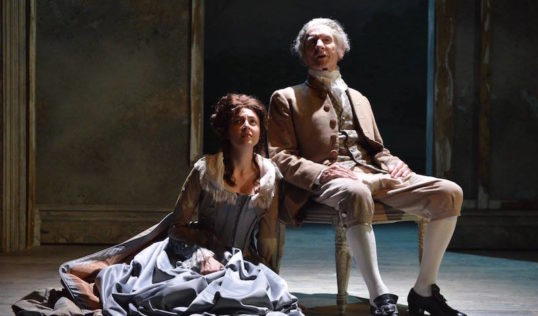A Tale of Two Cities
★★★☆☆ What the Dickens?
King’s Theatre: Tue 8 – Sat 12 Nov 2016
Review by Martin Gray
The adaptation of one of Charles Dickens’ most famous works, A Tale of Two Cities, at the King’s this week has more than a few misfires but finally proves an entertaining melodrama.
It tells of two men linked by circumstance and destiny against the backdrop of the French Revolution. Charles Darnay is a French aristocrat who has renounced his title, is living in England and is in love with Lucie, daughter of a French doctor unjustly imprisoned in the Bastille for 18 long years. Sydney Carton is the sharp but debauched solicitor who saves Darnay’s life with courtroom theatrics when he’s accused at the Old Bailey of spying for the French and Americans.
It’s a cracking story, beginning with one of the most famous openings in literature and closing with an equally renowned speech. Both are retained, though the opening words are less successful than the closing thoughts of Carton; shared out among the cast, they’re drowned out by incidental music.
This play likes its music a lot, with Rachel Portman’s score booming out at every inopportune opportunity. Incidental music in stage plays is awkward at the best of times, and here it works against the drama, not so much underscoring as crushing the action and deafening the audience.
We even get music before curtain up, with players, standing behind gauze, softly singing… something or other for ten long minutes; the blameless shuffling of arriving punters means it’s impossible to hear what’s being sung, though the tone is pleasant enough. Maybe the songs in themselves aren’t important, perhaps they’re there simply to set a mood of mournfulness. If so, it’s a mood immediately clobbered by the jolly daftness of the first scene as various witnesses condemn Darnay, and Carton shows what he can do.
Given that Joseph Timms’ Carton is so masterful in court it’s jarring that the next time we see him, immediately after Darnay’s release, he’s a self-pitying drunk – the narrative connectivity just isn’t there. Carton remains in sad sack mode for the entire first act, in a performance that’s less Carton than cartoon. It’s difficult to see what Lucie sees in him, but for some reason she lets Carton visit the family home so often he falls in love with her (she does tell Darnay there’s a reason she favours Carton, but she can’t tell him; she might have at least told us).
commendable stoicism
Lucie’ first appearance is as a vital witness in Darnay’s trial but, sadly, Shanaya Rafaat is almost inaudible: her delivery improves, but she hasn’t got much of a character to grab onto – it’s impossible to see why two men would be in love with this insipid, weirdly giggling creature.
Jacob Ifan brings a commendable stoicism to Darnay, but no spark, it’s difficult to care whether he lives or dies… mind, Madame Guillotine has to be preferable to wetter-than-the-Seine Lucie.
As her father, Dr Manette, Patrick Romer is rock solid, while Michael Garner as loyal friend Lorry is decent, though his deliver is occasionally a tad Frankie Howerd. And these moments aren’t the only accidental, unfortunate nods to Carry On, Don’t Lose Your Head because the peasants really are revolting, the worst offenders being the French judge apparently played by punk poet John Cooper Clarke and the sinister sawyer straight out of River City.
It’s a bit of tradition to have posh foreign characters speak RP while the commoners have strong regional accents and it never works, it’s horribly condescending. In this case someone refers to the sawyer’s Frenchness ten seconds after his broad Trainspotting impression, lampshading the ridiculousness of the conceit. Couldn’t someone just try an actual Gallic accent?
When the music disappears we’re assailed by sound effects. You want wind? You got it. Courtroom laughter. Check. Thunder? Oh yes, and we’ll throw in some lightning flashes because something Really Dramatic just happened. Add in Carton’s occasional speeches from one side of the action and it all gets perilously close to panto.
Which isn’t to say Mike Poulton’s adaptation is dreadful – stripping Dickens’ meaty novel down to a couple of hours without losing the major character arcs and narrative incidents isn’t easy and there are some nicely written individual scenes. And the actors work hard, keeping up with the breathless pace of director James Dacre’s production. It’s more a problem that creative choices – the staging, the soundscape, the music… all add up to less than the sum of their parts.
Are there far, far better things out there? Undoubtedly. But if you’re in the mood for an enthusiastic staging of a well-loved tale, and don’t mind a production that runs towards overwrought, enjoy.
Running time 2 hours 35 minutes (including one interval)
King’s Theatre, 2 Leven Street EH3 9LQ.
Tuesday 8 – Saturday 12 November 2016
Daily: 7.30pm; Matinee Wed and Sat: 2.30pm.
Details and tickets from: http://www.edtheatres.com/twocities
| A Tale of Two Cities on tour: | |||
|---|---|---|---|
| Tue 8 – Sat 12 November | Edinburgh King’s Theatre |
0131 529 6000 | Book online |
| Tue 15 – Sat 19 November | Cheltenham Everyman Theatre |
01242 572573 | Book online |
| Tue 22 -Sat 26 November | Nottingham Theatre Royal |
0115 989 555 | Book online |
ENDS





















Comments (1)
Trackback URL | Comments RSS Feed
Sites That Link to this Post